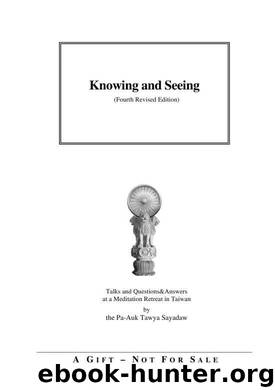Knowing and Seeing by Pa Auk Sayadaw

Author:Pa Auk Sayadaw
Language: eng
Format: mobi
Tags: Pa Auk Sayadaw, Vipassana, Theravada, Anapanasati, Mindfulness, Jhana, Buddhism, 4 Elements Meditation, Meditation, Enlightenment, Abhidhamma, 5 Faculties
3
a:g
Further Notes for Table lb 'The Mind-Door Process'
• Cognition follows a fixed procedure, according to the natural law of consciousness (citta-niydmd). For example, visual cognition: 318 1st) Eye-door process that 'picks-up' the object; cognizes colour. (See table 'lc:
The Five-Door Process', p.168.) 2nd) Mind-door process that perceives the colour; knows the past colour, the
object of the eye-door process. 3rd) Mind-door process that knows which colour it is; knows the colour's name. 4th) Mind-door process that knows the object's 'meaning'; sees the whole image, a concept determined by past experience (perception (samdj). 5th) Mind-door process that judges and feels. This is the beginning of true cognition. In the preceding mental processes, the volition of the impulsions is only weak, which means the kamma can produce a result only in that life's continuance (pavatti): it cannot produce a rebirth-linking consciousness (patisandhi-citta). It is from the fifth mind-door process onwards that the concept is known: 'a man', 'a woman', 'a pot', 'a sarong', 'gold', 'silver' etc. And it is from that mental process onwards that there is mental proliferation (papahca), and the accomplishment of kamma: accomplished by the mental factor volition (cetand) of each impulsion consciousness, which takes the same object.
With wise attention (yoniso manasikdra), wholesome kamma is accomplished with, for example, respect for and worship of one's teacher, a Buddha-statue or a bhikkhu; knowing one's samatha meditation subject, and with vipassana knowledge seeing formations as impermanence (anicca), suffering (dukkha), non-self (an-atta), or foulness (asubha).
With unwise attention (ayoniso manasikdra), unwholesome kamma is accomplished when one sees self, husband, wife, children, property, etc. as existing according to reality: as permanence (nicca), happiness (sukha), self (atta), or beauty (subha).
With this same object and perception arise countless mental processes (series of mental formations (sankhard)), reinforcing the cognition, until again the mind adverts to a new object.
HOW YOU DISCERN SENSUAL SPHERE PROCESSES WISE AND UNWISE ATTENTION
A jhana-attainment process (which is a mind-door process of either the fine-material sphere or immaterial sphere) is always wholesome: it can never be unwholesome. But a sensual-sphere process (either a five-door-, or a mind-door process) is either wholesome or unwholesome: it depends on wise attention (yoniso manasikdra) or unwise attention (ayoniso manasikdra).
318 For further details, see Q&As 3.5, 3.11, 7.9, 7.11, 7.12, and Abs.
Attention determines whether a sensual-sphere process is wholesome or unwholesome.
If you look at an object and know it as materiality, mentality, cause or effect, impermanence, suffering, non-self, or repulsiveness, then your attention is wise attention, and the impulsion consciousness is wholesome.
If you look at an object and see it as a concept, such as a person, man, woman, being, gold, silver, or see it as permanence, happiness, or self, then your attention is unwise attention, and the impulsion consciousness is unwholesome.
In exceptional cases, however, an impulsion consciousness connected with a concept may be wholesome, for example, when practising loving-kindness and making offerings. You will see the difference when you discern those mental processes.
HOW YOU DISCERN MIND-DOOR PROCESSES
To discern sensual-sphere processes, you should begin by discerning a mind-door process, because there the types of consciousness are fewer.
Download
This site does not store any files on its server. We only index and link to content provided by other sites. Please contact the content providers to delete copyright contents if any and email us, we'll remove relevant links or contents immediately.
The Way of Zen by Alan W. Watts(6592)
Ego Is the Enemy by Ryan Holiday(5409)
The Art of Happiness by The Dalai Lama(4120)
The Book of Joy by Dalai Lama(3968)
Why Buddhism is True by Robert Wright(3442)
Spark Joy by Marie Kondo(3296)
Shift into Freedom by Loch Kelly(3192)
Happiness by Matthieu Ricard(3037)
A Monk's Guide to a Clean House and Mind by Shoukei Matsumoto(2901)
The Lost Art of Good Conversation by Sakyong Mipham(2638)
The Meaning of the Library by unknow(2563)
The Unfettered Mind: Writings from a Zen Master to a Master Swordsman by Takuan Soho(2294)
The Third Eye by T. Lobsang Rampa(2256)
Anthology by T J(2203)
Red Shambhala by Andrei Znamenski(2187)
The Diamond Cutter by Geshe Michael Roach(2058)
Thoughts Without A Thinker: Psychotherapy from a Buddhist Perspective by Epstein Mark(2007)
Twilight of Idols and Anti-Christ by Friedrich Nietzsche(1888)
Advice Not Given by Mark Epstein(1877)
